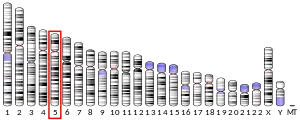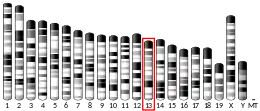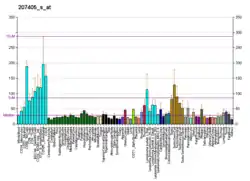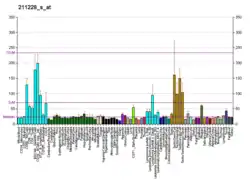RAD17
Cell cycle checkpoint protein RAD17 is a protein that in humans is encoded by the RAD17 gene.[5][6]
Function
The protein encoded by this gene is highly similar to the gene product of Schizosaccharomyces pombe rad17, a cell cycle checkpoint gene required for cell cycle arrest and DNA damage repair in response to DNA damage. This protein shares strong similarity with DNA replication factor C (RFC), and can form a complex with RFCs. This protein binds to chromatin prior to DNA damage and is phosphorylated by ATR after the damage. This protein recruits the RAD1-RAD9-HUS1 checkpoint protein complex onto chromatin after DNA damage, which may be required for its phosphorylation. The phosphorylation of this protein is required for the DNA-damage-induced cell cycle G2 arrest, and is thought to be a critical early event during checkpoint signaling in DNA-damaged cells. Eight alternatively spliced transcript variants of this gene, which encode four distinct proteins, have been reported.[7]
Meiosis
During meiosis in yeast and in mammals, RAD17 protein functions as a DNA damage sensor promoting DNA checkpoint control.[8] In yeast, the RAD17 protein facilitates proper assembly of the meiotic crossover recombination complex containing the RAD51 protein, thus promoting efficient repair of meiotic DNA double-strand breaks.[9] During male meiosis in maize (Zea mays), the ZmRAD17 gene is involved in repair of DNA double strand breaks, likely by promoting synaptonemal complex assembly.[8]
Interactions
RAD17 has been shown to interact with:
References
- ENSG00000152942 GRCh38: Ensembl release 89: ENSG00000276618, ENSG00000152942 - Ensembl, May 2017
- GRCm38: Ensembl release 89: ENSMUSG00000021635 - Ensembl, May 2017
- "Human PubMed Reference:". National Center for Biotechnology Information, U.S. National Library of Medicine.
- "Mouse PubMed Reference:". National Center for Biotechnology Information, U.S. National Library of Medicine.
- Bao S, Shen X, Shen K, Liu Y, Wang XF (December 1998). "The mammalian Rad24 homologous to yeast Saccharomyces cerevisiae Rad24 and Schizosaccharomyces pombe Rad17 is involved in DNA damage checkpoint". Cell Growth & Differentiation. 9 (12): 961–967. PMID 9869296.
- Parker AE, Van de Weyer I, Laus MC, Verhasselt P, Luyten WH (July 1998). "Identification of a human homologue of the Schizosaccharomyces pombe rad17+ checkpoint gene". The Journal of Biological Chemistry. 273 (29): 18340–18346. doi:10.1074/jbc.273.29.18340. PMID 9660800.
- "Entrez Gene: RAD17 RAD17 homolog (S. pombe)".
- Zhang T, Jing JL, Liu L, He Y (2021). "ZmRAD17 Is Required for Accurate Double-Strand Break Repair During Maize Male Meiosis". Frontiers in Plant Science. 12: 626528. doi:10.3389/fpls.2021.626528. PMC 7952653. PMID 33719299.
- Shinohara M, Sakai K, Ogawa T, Shinohara A (July 2003). "The mitotic DNA damage checkpoint proteins Rad17 and Rad24 are required for repair of double-strand breaks during meiosis in yeast". Genetics. 164 (3): 855–865. doi:10.1093/genetics/164.3.855. PMC 1462628. PMID 12871899.
- Bao S, Tibbetts RS, Brumbaugh KM, Fang Y, Richardson DA, Ali A, et al. (June 2001). "ATR/ATM-mediated phosphorylation of human Rad17 is required for genotoxic stress responses". Nature. 411 (6840): 969–974. Bibcode:2001Natur.411..969B. doi:10.1038/35082110. PMID 11418864. S2CID 4429058.
- Kim ST, Lim DS, Canman CE, Kastan MB (December 1999). "Substrate specificities and identification of putative substrates of ATM kinase family members". The Journal of Biological Chemistry. 274 (53): 37538–37543. doi:10.1074/jbc.274.53.37538. PMID 10608806.
- Bermudez VP, Lindsey-Boltz LA, Cesare AJ, Maniwa Y, Griffith JD, Hurwitz J, Sancar A (February 2003). "Loading of the human 9-1-1 checkpoint complex onto DNA by the checkpoint clamp loader hRad17-replication factor C complex in vitro". Proceedings of the National Academy of Sciences of the United States of America. 100 (4): 1633–1638. Bibcode:2003PNAS..100.1633B. doi:10.1073/pnas.0437927100. PMC 149884. PMID 12578958.
- Rauen M, Burtelow MA, Dufault VM, Karnitz LM (September 2000). "The human checkpoint protein hRad17 interacts with the PCNA-like proteins hRad1, hHus1, and hRad9". The Journal of Biological Chemistry. 275 (38): 29767–29771. doi:10.1074/jbc.M005782200. PMID 10884395.
- Chang MS, Sasaki H, Campbell MS, Kraeft SK, Sutherland R, Yang CY, et al. (December 1999). "HRad17 colocalizes with NHP2L1 in the nucleolus and redistributes after UV irradiation". The Journal of Biological Chemistry. 274 (51): 36544–36549. doi:10.1074/jbc.274.51.36544. PMID 10593953.
- Post SM, Tomkinson AE, Lee EY (October 2003). "The human checkpoint Rad protein Rad17 is chromatin-associated throughout the cell cycle, localizes to DNA replication sites, and interacts with DNA polymerase epsilon". Nucleic Acids Research. 31 (19): 5568–5575. doi:10.1093/nar/gkg765. PMC 206465. PMID 14500819.
- Dufault VM, Oestreich AJ, Vroman BT, Karnitz LM (December 2003). "Identification and characterization of RAD9B, a paralog of the RAD9 checkpoint gene". Genomics. 82 (6): 644–651. doi:10.1016/s0888-7543(03)00200-3. PMID 14611806.
- Lindsey-Boltz LA, Bermudez VP, Hurwitz J, Sancar A (September 2001). "Purification and characterization of human DNA damage checkpoint Rad complexes". Proceedings of the National Academy of Sciences of the United States of America. 98 (20): 11236–11241. Bibcode:2001PNAS...9811236L. doi:10.1073/pnas.201373498. PMC 58713. PMID 11572977.
Further reading
- Li L, Li HS, Pauza CD, Bukrinsky M, Zhao RY (2006). "Roles of HIV-1 auxiliary proteins in viral pathogenesis and host-pathogen interactions". Cell Research. 15 (11–12): 923–934. doi:10.1038/sj.cr.7290370. PMID 16354571.
- al-Khodairy F, Carr AM (April 1992). "DNA repair mutants defining G2 checkpoint pathways in Schizosaccharomyces pombe". The EMBO Journal. 11 (4): 1343–1350. doi:10.1002/j.1460-2075.1992.tb05179.x. PMC 556583. PMID 1563350.
- Mossi R, Jónsson ZO, Allen BL, Hardin SH, Hübscher U (January 1997). "Replication factor C interacts with the C-terminal side of proliferating cell nuclear antigen". The Journal of Biological Chemistry. 272 (3): 1769–1776. doi:10.1074/jbc.272.3.1769. PMID 8999859. S2CID 14454322.
- Dean FB, Lian L, O'Donnell M (December 1998). "cDNA cloning and gene mapping of human homologs for Schizosaccharomyces pombe rad17, rad1, and hus1 and cloning of homologs from mouse, Caenorhabditis elegans, and Drosophila melanogaster". Genomics. 54 (3): 424–436. doi:10.1006/geno.1998.5587. PMID 9878245.
- Bluyssen HA, Naus NC, van Os RI, Jaspers I, Hoeijmakers JH, de Klein A (January 1999). "Human and mouse homologs of the Schizosaccharomyces pombe rad17+ cell cycle checkpoint control gene". Genomics. 55 (2): 219–228. doi:10.1006/geno.1998.5642. PMID 9933569.
- Li L, Peterson CA, Kanter-Smoler G, Wei YF, Ramagli LS, Sunnerhagen P, et al. (March 1999). "hRAD17, a structural homolog of the Schizosaccharomyces pombe RAD17 cell cycle checkpoint gene, stimulates p53 accumulation". Oncogene. 18 (9): 1689–1699. doi:10.1038/sj.onc.1202469. PMID 10208430.
- Bao S, Chang MS, Auclair D, Sun Y, Wang Y, Wong WK, et al. (May 1999). "HRad17, a human homologue of the Schizosaccharomyces pombe checkpoint gene rad17, is overexpressed in colon carcinoma". Cancer Research. 59 (9): 2023–2028. PMID 10232579.
- von Deimling F, Scharf JM, Liehr T, Rothe M, Kelter AR, Albers P, et al. (1999). "Human and mouse RAD17 genes: identification, localization, genomic structure and histological expression pattern in normal testis and seminoma". Human Genetics. 105 (1–2): 17–27. doi:10.1007/s004390051058. PMID 10480350.
- Chang MS, Sasaki H, Campbell MS, Kraeft SK, Sutherland R, Yang CY, et al. (December 1999). "HRad17 colocalizes with NHP2L1 in the nucleolus and redistributes after UV irradiation". The Journal of Biological Chemistry. 274 (51): 36544–36549. doi:10.1074/jbc.274.51.36544. PMID 10593953.
- Kim ST, Lim DS, Canman CE, Kastan MB (December 1999). "Substrate specificities and identification of putative substrates of ATM kinase family members". The Journal of Biological Chemistry. 274 (53): 37538–37543. doi:10.1074/jbc.274.53.37538. PMID 10608806.
- Burtelow MA, Kaufmann SH, Karnitz LM (August 2000). "Retention of the human Rad9 checkpoint complex in extraction-resistant nuclear complexes after DNA damage". The Journal of Biological Chemistry. 275 (34): 26343–26348. doi:10.1074/jbc.M001244200. PMID 10852904.
- Rauen M, Burtelow MA, Dufault VM, Karnitz LM (September 2000). "The human checkpoint protein hRad17 interacts with the PCNA-like proteins hRad1, hHus1, and hRad9". The Journal of Biological Chemistry. 275 (38): 29767–29771. doi:10.1074/jbc.M005782200. PMID 10884395.
- Hartley JL, Temple GF, Brasch MA (November 2000). "DNA cloning using in vitro site-specific recombination". Genome Research. 10 (11): 1788–1795. doi:10.1101/gr.143000. PMC 310948. PMID 11076863.
- Wiemann S, Weil B, Wellenreuther R, Gassenhuber J, Glassl S, Ansorge W, et al. (March 2001). "Toward a catalog of human genes and proteins: sequencing and analysis of 500 novel complete protein coding human cDNAs". Genome Research. 11 (3): 422–435. doi:10.1101/gr.GR1547R. PMC 311072. PMID 11230166.
- Bao S, Tibbetts RS, Brumbaugh KM, Fang Y, Richardson DA, Ali A, et al. (June 2001). "ATR/ATM-mediated phosphorylation of human Rad17 is required for genotoxic stress responses". Nature. 411 (6840): 969–974. Bibcode:2001Natur.411..969B. doi:10.1038/35082110. PMID 11418864. S2CID 4429058.
- Lindsey-Boltz LA, Bermudez VP, Hurwitz J, Sancar A (September 2001). "Purification and characterization of human DNA damage checkpoint Rad complexes". Proceedings of the National Academy of Sciences of the United States of America. 98 (20): 11236–11241. Bibcode:2001PNAS...9811236L. doi:10.1073/pnas.201373498. PMC 58713. PMID 11572977.
- Chen MS, Higashikubo R, Laszlo A, Roti Roti J (October 2001). "Multiple alternative splicing forms of human RAD17 and their differential response to ionizing radiation". Gene. 277 (1–2): 145–152. doi:10.1016/S0378-1119(01)00692-8. PMID 11602352.
- Post S, Weng YC, Cimprich K, Chen LB, Xu Y, Lee EY (November 2001). "Phosphorylation of serines 635 and 645 of human Rad17 is cell cycle regulated and is required for G(1)/S checkpoint activation in response to DNA damage". Proceedings of the National Academy of Sciences of the United States of America. 98 (23): 13102–13107. Bibcode:2001PNAS...9813102P. doi:10.1073/pnas.231364598. PMC 60831. PMID 11687627.






